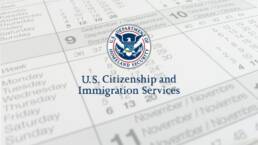U.S. Citizenship and Immigration Services (USCIS) recently announced an update to its Policy Manual, introducing provisions that allow USCIS officers to excuse a nonimmigrant’s failure to timely file an extension of stay or change of status request if the delay was due to extraordinary circumstances beyond the control of the applicant or petitioner.
The update clarifies that extraordinary circumstances may include, but are not limited to, where the delay was due to a slowdown or stoppage of work involving a strike, lockout, or other labor dispute, or where the primary reason for the late filing is the inability to obtain a certified labor condition application or temporary labor certification due to a lapse in government funding supporting those certifications.
This update not only reflects a more nuanced approach to handling extension and change of status requests but also addresses a commitment outlined in the report by the H-2B Worker Protection Task Force. The report emphasizes the importance of ensuring that individuals affected by workplace labor disputes are not penalized when seeking subsequent visas or changes of immigration status.
While USCIS does not directly issue visas, the agency adjudicates extension of stay and change of status requests. Generally, certain nonimmigrants present in the United States who are admitted for a specified period, or their petitioners, may request an extension of their admission period in order to continue to engage in those activities permitted under the nonimmigrant classification in which they were admitted. Similarly, certain nonimmigrants present in the United States, or their petitioners, may seek to change their status to another nonimmigrant classification if they meet certain requirements.
However, USCIS generally does not approve extensions or changes of status for individuals who have failed to maintain their previously accorded status or whose status has expired before the filing date of the application or petition. Despite this, the update acknowledges that certain circumstances may warrant exceptions, allowing USCIS to exercise discretion in excusing the failure to file before the period of authorized stay expires.
This policy shift underscores USCIS’s commitment to fairness and flexibility within the immigration system, recognizing that unforeseen circumstances can impact an individual’s ability to adhere to strict filing deadlines. By considering extraordinary circumstances, USCIS aims to mitigate the adverse effects of bureaucratic delays or external factors beyond the applicant’s control.
If you have any questions about the new USCIS policy update, contact our office today to set up a consultation with one of our attorneys!
Ready to have Berardi on your side?
Whether you’re a business looking to hire or a professional hoping to relocate, immigration law can be complicated. But you don’t have to do it alone. Put our experience to work for you.



